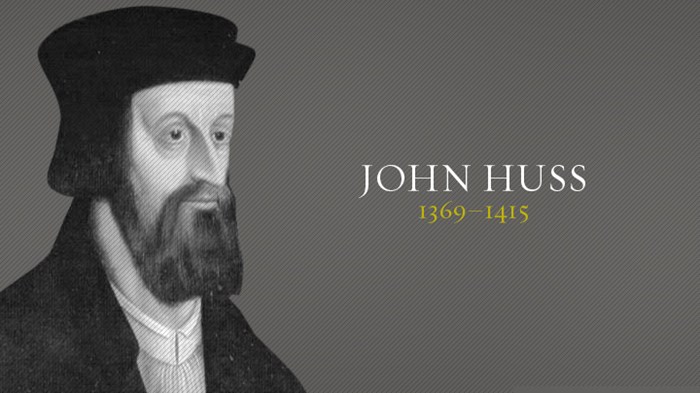
This year, Protestants
around the world celebrate the 500th anniversary of the Reformation.
On Truth for Today, we have already
looked back on the influence of John Wycliffe, “The Morning Star” of the
Reformation (click here). Now we look at another courageous man of faith who led the charge
to rescue the Gospel from man-made traditions.
Early in his monastic
career, Martin Luther, rummaging through the stacks of a library, happened upon
a volume of sermons by John Huss, the Bohemian who had been condemned as a
heretic. “I was overwhelmed with astonishment,” Luther later wrote. “I could
not understand for what cause they had burnt so great a man, who explained the
Scriptures with so much gravity and skill.” Huss would become a hero to Luther
and many other Reformers, for he preached key Reformation themes a century
before Luther drew up his Ninety-Five Theses.

John Huss was born in 1369
to peasant parents. As a young man he trained for the ministry and in 1401 he became
the preacher at Prague’s Bethlehem Chapel (which held 3,000), the most popular
church in one of the largest of Europe’s cities.
During his years as pastor
in Prague, Huss was deeply influenced by the life and teachings of Wycliffe.
Like Wycliffe, Huss believed that the Catholic Church had grown corrupt and
needed radical reform. He rejected the Church’s doctrine of relics—the notion
that if someone touched an artifact that formally belonged to martyr—a wisp of
hair, a patch of their cloak, or a piece of bone—that special blessings were
imparted from the martyr to the worshipper.
Huss also preached against
the Church’s doctrine of indulgences, which stated that a believer could pay
for a Church authorized document that guaranteed you or someone else could be
freed from the temporal consequences of sin. For example, you could buy an
indulgence for your recently deceased mother which would cut 1,000 years off
her soul’s time in purgatory.
Like Wycliffe, Huss argued
that the Bible alone was the basis for spiritual authority—not the Church, not
councils, not traditions—and that the Bible should be available to the common
man. For his bold preaching Huss was declared a heretic by the Pope. In
November 1414, the Council of Constance assembled, and Huss was given the
chance to defend his beliefs.
When Huss saw he wasn’t to
be given a forum for explaining his ideas, let alone a fair hearing, he finally
said, “I appeal to Jesus Christ, the only judge who is almighty and completely
just. In his hands I plead my cause, not on the basis of false witnesses and
erring councils, but on truth and justice.”
Huss was thrown into
solitary confinement, where many pleaded with him to recant. On July 6, 1415,
he was taken to the cathedral, dressed in his priestly garments, then stripped
of them one by one. A paper crown was placed on his head with the words written
across, “The Chief of Heretics.” He refused one last chance to recant at the stake,
where he prayed, “Lord Jesus, it is for thee that I patiently endure this cruel
death. I pray thee to have mercy on my enemies.” He was heard reciting the
Psalms as the flames engulfed him.
The Execution of John Huss
Interestingly, the word “huss” is Czech for the word “goose.” A
priest who watched the execution reported that before Huss died, he said, “You
can cook this goose [huss] but within
a century a swan shall arise who will prevail.” Thus, the origin of the
expression, “Your goose is cooked.” A century later, Martin Luther saw himself
as the fulfillment of Huss’ prophecy. Exactly 102 years after Huss was martyred,
Luther nailed his Ninety-Five Theses to
the door of the Castle Church in Wittenberg.[1]
[1] Mark
Galli and Ted Olsen, eds. 131 Christians Everyone Should Know (Nashville, TN: B&H
Publishing, 2000), 369-361.
2 Erwin Lutzer, Rescuing the Gospel (Grand Rapids, MI: Baker, 2016), 12-21.

No comments:
Post a Comment